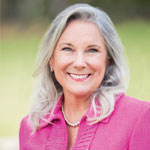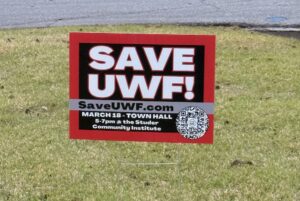
This week on “We Don’t Color On the Dog,” we had the pleasure of sitting down with Dr. Judy Bense, President Emeritus of the University of West Florida. We’ve known each other for years, shared a few midnight chimes together, and she’s never been one to mince words.
- The issue at hand is the governor’s selection of eight new trustees to UWF’s board who aren’t locals, don’t know our university, and appear to be on a political mission.
 Judy laid it out plainly. When she became president, UWF was “a little tiny college of 4 or 5,000 students up on the hill in the woods keeping our head down.” She saw the dangers immediately — UWF had just escaped a second takeover attempt by FSU, and she knew another was coming.
Judy laid it out plainly. When she became president, UWF was “a little tiny college of 4 or 5,000 students up on the hill in the woods keeping our head down.” She saw the dangers immediately — UWF had just escaped a second takeover attempt by FSU, and she knew another was coming.
“If you think the faculty can save us, you’re wrong. The students can’t save us. The staff can’t save us,” she told me. “It’s the community that can save us and that will fight for us. But we have to make ourselves valuable to them.”
That’s exactly what she did during her nine-year presidency—she put up billboards highlighting achievements, built dormitories that rivaled major universities, expanded downtown presence, and made UWF relevant to Pensacola.
- The results? Donations skyrocketed, and the university became a key economic driver. As Sena Madison pointed out during our conversation, UWF’s presence helped transform our entrepreneurship and tech landscapes.
“Subtract the University of West Florida from the community,” Judy challenged. “Just subtract it, look at the ripple effect, look at the things that would stop, look at the things it wouldn’t allow to begin.”
The Martha Saunders Factor
 Under Judy’s successor, Dr. Martha Saunders (whom Judy recruited from retirement), the university climbed the performance metrics from the bottom to one of the top in the state.
Under Judy’s successor, Dr. Martha Saunders (whom Judy recruited from retirement), the university climbed the performance metrics from the bottom to one of the top in the state.
“In my opinion, one of the most important things that Martha did for the university, inside the academic environment of Florida, is to bring our status up,” Judy said, “We were no longer and are no longer the little college out in the woods with 5,000 students. We are an academic player that we can perform, and we do perform.”
Bottom Line
 UWF’s performance makes the current situation all the more troubling. The governor’s appointees have already voted as a block to install Boise State professor Scott Yenor as chairman. Donations are being paused, enrollment may be affected, and the community is rightfully concerned.
UWF’s performance makes the current situation all the more troubling. The governor’s appointees have already voted as a block to install Boise State professor Scott Yenor as chairman. Donations are being paused, enrollment may be affected, and the community is rightfully concerned.
- That’s why Judy has joined with concerned citizens to form Save UWF. “These are not part of the problem people,” she said of the grassroots organization. “These are problem solvers.”
A town hall meeting is scheduled for Tuesday, March 18th, at 5 p.m., at the SCI building downtown (the old SunTrust building for you old-timers like me). It’s an opportunity to learn more about what’s happening and strategize on what we can do as a community.
“We realize that we might not be able to change this, but we are going to try anyway,” Judy explained. “If we don’t try to change the governor’s mind or to change the committee member’s mind who has to approve these nominees, then we will be complicit.”
State Senator Don Gaetz, who chairs the committee that must approve these appointments, is reportedly not happy with this process. The fight is far from over.
- As Judy put it, “I don’t think they’re miracles, but every once in a while, there’s a twist that happens. And if you’re still on the track, if you’re still fighting the good fight, you can actually make ground and maybe win.”
For the sake of UWF and our community, I hope she’s right.
Podcast
The YouTube podcast of our interview goes live at 9 a.m. this morning – link.




I intend to be at that townhall meeting. Thank you for this article.